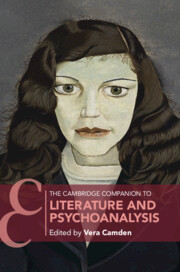Book contents
- The Cambridge Companion to Literature and Psychoanalysis
- The Cambridge Companion to Literature and Psychoanalysis
- Copyright page
- Contents
- Figures
- Abbreviations
- Contributors
- Acknowledgments
- Chronology
- Introduction Reading to Recover
- Part I In History
- Part II In Society
- Part III In Sight
- Part IV In Theory
- 13 Why Literature? Why Psychoanalysis?
- 14 Beyond the Fragmented Subject
- 15 Queering Melancholia
- 16 Animal Figures
- Further Reading
- Index
15 - Queering Melancholia
Bad Feelings in Giovanni’s Room
from Part IV - In Theory
Published online by Cambridge University Press: 16 December 2021
- The Cambridge Companion to Literature and Psychoanalysis
- The Cambridge Companion to Literature and Psychoanalysis
- Copyright page
- Contents
- Figures
- Abbreviations
- Contributors
- Acknowledgments
- Chronology
- Introduction Reading to Recover
- Part I In History
- Part II In Society
- Part III In Sight
- Part IV In Theory
- 13 Why Literature? Why Psychoanalysis?
- 14 Beyond the Fragmented Subject
- 15 Queering Melancholia
- 16 Animal Figures
- Further Reading
- Index
Summary
This chapter considers the significance of the psychoanalytic concept of melancholia to queer theory and literature, using James Baldwin’s Giovanni’s Room as a case study. The chapter traces the ways in which queerness – particularly queer love – is haunted by melancholia by highlighting the manner in which melancholia is inextricable from the passionate relationship between David and Giovanni, the lovers at the novel’s core. Yet Baldwin arguably also universalizes melancholia by demonstrating that all of the novel’s characters, including David’s girlfriend Hella, are deeply melancholic. Melancholia, then, is not merely a queer predicament but rather – as the psychoanalyst Jacques Lacan also claimed – a part of the human condition. The chapter consequently draws a distinction between constitutive (existential) and context-specific (socially imposed) forms of melancholia, illustrating that queer melancholia tends to fall into the latter genre of melancholia due to the discrimination, persecution, and shame that often characterize queer lives and loves.
Keywords
- Type
- Chapter
- Information
- The Cambridge Companion to Literature and Psychoanalysis , pp. 275 - 288Publisher: Cambridge University PressPrint publication year: 2021

